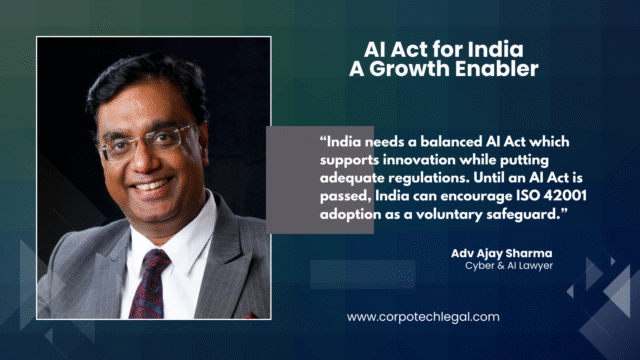Introduction
Artificial Intelligence (AI) is no longer a futuristic concept — it is already transforming industries, societies, and governance across the globe. From healthcare to finance, from manufacturing to education, AI promises efficiencies and breakthroughs on an unprecedented scale. But with these opportunities come risks: bias, misuse, job displacement, privacy violations, and even systemic threats to democratic and economic stability.
Across the world, regulators are grappling with how best to harness the power of AI while mitigating its dangers. The European Union has moved forward with its landmark AI Act, the United States has issued executive guidance, and countries like Singapore and Canada are experimenting with governance sandboxes. India, with its fast-growing AI ecosystem and vast digital economy, cannot afford to lag behind.
Why India Needs an AI Act
India’s journey with digital laws began with the IT Act, 2000 and has since evolved with legislations like the Digital Personal Data Protection (DPDP) Act, 2023. However, these frameworks only indirectly address AI risks. A dedicated AI Act is required to provide:
- Legal clarity on AI use, liability, and accountability.
- Trust and safety for businesses and consumers.
- Confidence to global investors that India is serious about responsible innovation.
Till such a law is enacted, the Government of India can “encourage” AI developers, users, and deployers to voluntarily adopt ISO/IEC 42001 — the world’s first AI management system standard — as a baseline. This would bridge the gap between innovation and governance in the interim.

A Balanced Approach
While global models like the EU AI Act provide useful data points, India should avoid a copy-paste approach. AI regulation must reflect India’s unique realities — a vibrant startup ecosystem, cost-sensitive markets, and a rapidly digitizing government.
A balanced approach is therefore crucial:
- Stakeholder consultations with startups, industry bodies, academia, and civil society must continue.
- Risk-based regulation should be considered, focusing on high-risk use cases (such as biometric surveillance, credit scoring, or healthcare diagnostics).
- Regulatory sandboxes could allow controlled experimentation while legal frameworks evolve.
By doing so, India can strike the right balance between enabling innovation and ensuring responsible deployment.
AI Investments & Regulatory Confidence
India is already witnessing strong interest from global technology leaders and investors in the AI and semiconductor domains. Recently, Arm’s CEO Rene Haas emphasized India’s growing role in AI and semiconductor ecosystems, while SoftBank has doubled down on its India bet, including a landmark collaboration with OpenAI.
These moves show that India has the talent, scale, and market to become a global AI hub. However, to fully unlock this potential, India needs a clear, forward-looking AI framework. A dedicated AI Act would:
- Provide regulatory certainty that global investors look for.
- Build trust and accountability in AI deployments.
- Position Indian companies to meet global compliance benchmarks.
History consistently shows that capital flows where rules are clear. If India combines its innovation-first ecosystem with smart AI governance, it can attract far greater global AI investments and establish itself as a leader in AI development and deployment.
Key Considerations for an Indian AI Act
Any future AI Act in India should be guided by certain foundational principles:
- Risk Classification – Differentiate obligations for low-risk, medium-risk, and high-risk AI systems.
- Transparency & Explainability – Mandate disclosures on how AI systems make decisions.
- Liability & Accountability – Clearly assign responsibility between developers, deployers, and users.
- Privacy & Data Protection – Ensure alignment with the DPDP Act and global data transfer standards.
- Innovation Sandbox – Allow startups to test AI solutions under relaxed compliance before scaling.
- Ethics & Human Oversight – Prevent harmful applications that undermine human dignity, fairness, or democracy.
Interim Step: ISO 42001 as a Bridge
Drafting, debating, and enacting an AI Act will take time. Meanwhile, the Government of India can encourage AI developers, deployers, and users to adopt ISO/IEC 42001:2023—the global AI Management System Standard.
ISO 42001 ensures:
- Structured risk assessment of AI models.
- Responsible data handling and privacy safeguards.
- Ongoing monitoring and governance of AI systems.
- Ethical alignment with global best practices.
Promoting ISO 42001 adoption now would help India build a culture of responsible AI, while preparing for the eventual AI Act.
Conclusion
India is at a turning point. The next decade will determine whether it becomes a global hub for AI innovation or merely a passive consumer of technologies developed elsewhere. With thoughtful regulation, India can create a framework that not only safeguards rights and values but also unlocks unprecedented economic growth.
An Indian AI Act, informed by stakeholder consultation, rooted in our realities, and benchmarked against global best practices, can provide exactly that. The time to act is now.
Author: Ajay Sharma – Techno-legal Advisor – CorpoTech Legal
